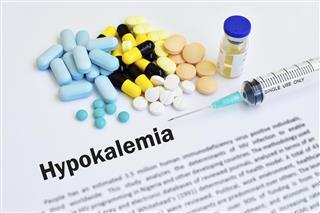
Right from diarrhea to hypertension, the effects of low potassium on our body exist in plenty. In fact, low potassium or hypokalemia can turn out to be fatal at times, and therefore it is very important to monitor potassium levels in the body, and replenish it, if found to be deficient.
Potassium is required by our body for smooth muscular and cellular functioning, cardiovascular functioning, muscle contraction, nerve transmission, for the conversion of glucose into glycogen and muscle building, etc. It is a natural diuretic as it helps in excreting excess amount of sodium from the body through urine. Potassium plays a very important role in maintaining fluid levels, electrolyte balance and pH level of the body. The most important functions of potassium in the human body are to keep blood pressure under control and help in intracellular nutrient transfer. It also helps in keeping acne, allergies, fatigue, kidney stones, etc., at bay.
Potassium plays an important role of a catalyst for many types of enzymes inside the human body. In other words, it helps in spawning many important chemical reactions. It is also believed to help in improving ATP hydrolysis. With so many important body functions to its credit, potassium is no doubt important for our overall health, such that if it is not present in sufficient amount it can hamper these body functions and result in adverse effects on our health.
The medical condition in which our body fails to retain the amount of potassium required for its day-to-day functioning leading to low levels of potassium in blood is called hypokalemia. It may prove to be fatal considering it has a crucial role to play in various body functions, all of which are bound to be affected by the alterations of the levels of this mineral in the body. While blood potassium level in the range of 3.6 to 5.2 mmol/L (millimoles per liter) is considered normal, potassium level below 2.5 mmol/L is considered to eb critically low, and requires prompt medical attention.
The effects of hypokalemia on the body may be very mild to severe. While a person suffering from primary staged hypokalemia may not experiencing anything unusual with the functioning of various organs initially, its effects are bound to get obvious with the severity of the condition. You will get to see the effects of low potassium levels in the body in form of following symptoms:
- Myalgia (muscle pain), muscular weakness and cramps.
- Cardiac arrhythmia i.e. abnormal rate of muscle contractions in the heart.
- Unexplained fatigue and weakness
- Hyponatremia, which may or may not be accompanied by anxiety.
- Impaired nerve transmission and deteriorated nervous system, which, in turn, results in confusion and delirium.
- Tingling and numbness in arms and legs
- Skin related problems such as blistering, skin eruptions, dryness of skin, acne, etc.
- Temporary memory loss or other problems like weak memory, difficulty in concentration, etc.
- Sleeplessness and irritability
- Intestinal or lung paralysis
- Heart related problems, such as heart deterioration.
- It may increase the risk of high blood pressure
- Ringing noise in the ear at times
- Digestive system may also get affected due to this deficiency and this may lead to constipation.
Potassium deficiency may also result in hypertension, depression, headache, etc. Critically low levels of potassium is life-threatening as it may cause permanent muscle damage, kidney damage, paralysis, etc.
A person is most likely to suffer from this deficiency due to excessive excretion of potassium or due to low potassium intake, both of which, in turn, are attributed to various factors coming into play. Most prominent causes of low potassium in people are:
- Potassium deficiency due to lack of potassium rich foods in the daily diet, i.e. insufficient potassium consumption.
- Excess potassium excretion through bowel motion or urine.
- Losing potassium as a result of vomiting, diarrhea or excessive sweating.
- Use of medication which can interfere and bring down the potassium levels in the body.
- Excessive use of diuretics and laxatives.
- Health problems such as diabetic ketoacidosis or chronic kidney failure.
- Hereditary defects of renal salt transporters, such as the Gitelman syndrome and the Bartter syndrome
If a person is suffering from diarrhea or any other condition which is causing hypokalemia, then he should be treated for the underlying problem so as to stop/regulate potassium loss from his body. At the same time, the physician may also prescribe medication to improve potassium levels in the body. The patient is generally asked to take balanced diet for days in order to restore the physical health pertaining to potassium level and its role in metabolism. Re-hydrating your body will be a good option to bring back the potassium levels to normal. Avoid drinking water, instead have electrolyte solution which contains high potassium which helps in bringing the potassium levels to normal. Basically, the physician will spell out the treatment plan to be followed only after taking the severity of the problem into consideration. In case of excess diarrhea and vomiting for more than 3 days consult a doctor immediately.
Prevention is better than cure, and a balanced diet is the key to prevent hypokalemia. You should include foods high in potassium, such as orange, banana, potato, tomato, watermelon, beans, cereals, meat, grapes, milk, yogurt, spinach, dried fruits (peaches, dates, apricots, raisins) etc., in your daily diet to strike that balance in your meal. While potassium supplements are looked upon as the ideal tools to tackle potassium deficiency and low potassium levels in blood, you should only resort to such supplements after consulting your physician.
Disclaimer: This HealthHearty article is for informative purposes only, and should not be used as a replacement for expert medical advice.




